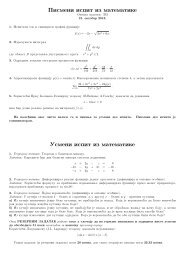WHITE BOOK 2004 EBU Tournament Directors' Guide Edited by ...
WHITE BOOK 2004 EBU Tournament Directors' Guide Edited by ...
WHITE BOOK 2004 EBU Tournament Directors' Guide Edited by ...
You also want an ePaper? Increase the reach of your titles
YUMPU automatically turns print PDFs into web optimized ePapers that Google loves.
White Book – November 2003 – Chapter V<br />
Example Suppose a player has bid 3, and now calls the TD and asks if he can<br />
change it. The TD convinces himself that it was not a mechanical error<br />
[which would mean that Law 25A would apply] and checks that the next<br />
player did not call before this player called for the TD, or indicated he<br />
needed the TD. If the next player has called then it is too late for Law 25B.<br />
In that case the TD would warn the player’s partner about unauthorised<br />
information and instruct the bidding to continue.<br />
Suppose it is in time. The Law book is written in such a way that it<br />
assumes that the player has made a change, or tried to. If, however, he is<br />
only asking whether he can, the TD must explain the effects of a change,<br />
then ask the player whether he wants to proceed with a change. He cannot<br />
be forced to make a change if he has never said how he would change the<br />
call. The TD should not ask the player what change he wants to make [and<br />
certainly not why!] until he has decided whether to proceed with the<br />
process. If he decides not to then as before the TD would warn the player’s<br />
partner about unauthorised information and instruct the bidding to continue.<br />
Now, suppose either that the player has indicated that he wants to go<br />
ahead, or that he originally did change his call, or attempted to. Now is the<br />
time for the TD to ascertain what change is proposed, and then go through<br />
Law 25B again in detail, reading it to the players, to discover which part<br />
applies on this occasion.<br />
25.3 Law 25A [Correction of an inadvertent call] [WBFLC]<br />
The attempt to correct must follow immediately the realisation of the mistake when<br />
bidding boxes are in use.<br />
For example, a player places a bidding card on the table, then gazes off into space.<br />
Eventually, he looks down and sees it is not the card he intended. So long as he<br />
attempts to change it now he is in time [if his partner has not subsequently called] even<br />
if it is quite some time after the call was originally placed.<br />
If LHO has called before this attempt to change he may withdraw it without penalty<br />
[Law 21B]. The withdrawn call is unauthorised to the side who originally made the<br />
wrong call but authorised to the other side [Law 16C].<br />
[WBFLC minutes 2000-08-30#6]<br />
25.4 Laws 25A and 45C4B [What is inadvertent?] [WBFLC]<br />
What is inadvertent? Assume the player intends to do one thing at the moment he<br />
reaches for the bidding box, or his pen or pencil if using written bidding, or for the<br />
bidding board, or starts to speak. Then it is inadvertent if his attention is drawn in that<br />
instant to some other matter and then he finds he has actually done something<br />
different. His mind has switched away from what he was doing.<br />
[WBFLC minutes 2000-08-30#7]<br />
37





